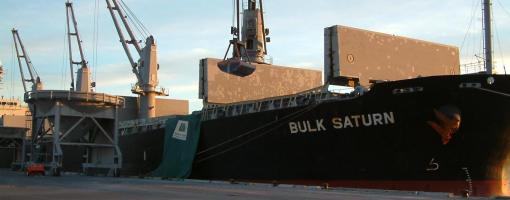
The Jebsen owned company Gearbulk is transporting phosphates from occupied Western Sahara, and ignoring the advises from the Ministry of Foreign Affairs to not carry out trade with the country.
By Ingvild Bruaset
Bergens Tidende, Norway
26 June 2007
Mr. Kristian Jebsen is president of the Bermuda registered company, run from London.
“British Ministry of Foreign Affairs has expressed that trade with the Moroccan occupying power in Western Sahara is not recommendable, but that there are no sanctions against such trade”, he states in a press release.
Executive director of the Rafto House, Mrs. Therese Jebsen is very critical vis-à-vis the activities of her third cousin.
“It is highly problematical, both ethically and politically, that a Norwegian ship owner accepts such a job.”
Dealers for Morocco
From 1975 until today, Morocco has occupied the little country Western Sahara on the African west coast. The country is rich in phosphates which are used in the fertilizer industry. The exploitation in Western Sahara is an important reason as to why Morocco today is one of the world's biggest exporters of phosphates.
“Because of the occupation, the Ministry of Foreign Affairs discourages all Norwegian companies to trade with Western Sahara”, says Assistant Director General Mr. Jørn Gjelstad in Section for Middle East at the Ministry of the Foreign Affairs.
The news service Norwatch, published by the organization Future in Our Hands, revealed this week that Gearbulk's vessel 'Bulk Saturn' arrived New Zealand with a cargo of several tens of thousand tones of phosphate.
“The Norwegian owners of the shipping company has a moral obligation to stop this transport”, says Erik Hagen in Norwatch.
[Translated from Norwegian by the Norwegian Support Committee for Western Sahara].
Order our Western Sahara poster!
“Try to Visit Western Sahara”…
The Security Council fails Western Sahara and international law
On 31 October 2025, a new resolution was adopted in the UN Security Council calling on the Saharawis to negotiate a solution that would entail their incorporation into the occupying power, Morocco.
Saharawis Demonstrate Against Trump Proposal
The United States has proposed in a meeting of the UN Security Council on Thursday that the occupied Western Sahara be incorporated into Morocco.
Skretting Turkey misled about sustainability
Dutch-Norwegian fish feed giant admits using conflict fishmeal from occupied Western Sahara. Last month, it removed a fake sustainability claim from its website.



